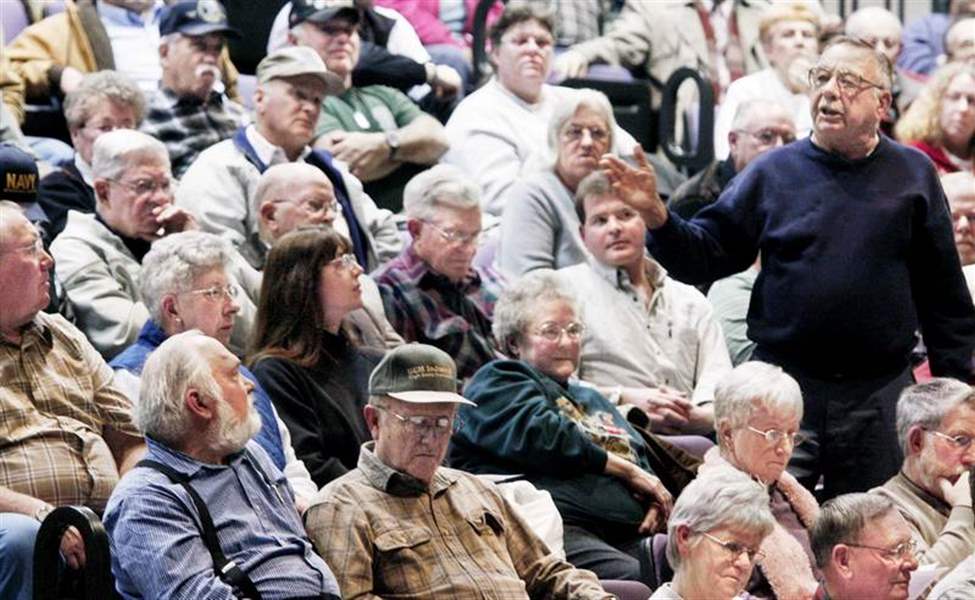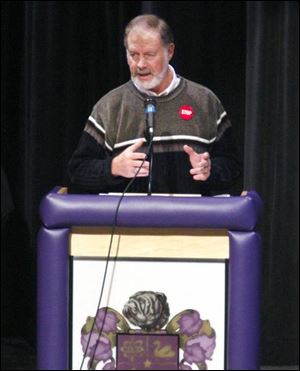
Opponents say talk of merger in Swanton 'doesn't add up'
2/27/2007
Former Fulton Township trustee Roger Bernath, standing, opposes a plan to merge Swanton and surrounding townships.

Former Fulton Township trustee Roger Bernath, standing, opposes a plan to merge Swanton and surrounding townships.
SWANTON - Any concept that bigger government is more efficient and cost-effective than smaller government is "absolutely nuts," Ohio Township Association Executive Director Mike Cochran told about 550 people at a meeting organized by opponents of merging the village of Swanton and its surrounding townships.
Much of the focus was on how taxes might increase if Harding and Swanton townships in Lucas County and Fulton and Swancreek townships in Fulton County would merge with Swanton to create a city of about 14,000 people.
Both leaders from the grassroots Stop the Merger Committee and the Ohio, Lucas County, and Fulton County township associations predicted that taxes would grow under a city government to far more than the 0.75 percent income tax suggested in the merger proposal.
The groups, which sponsored last night's meeting in the Swanton High School auditorium, listed the income tax rates of seven northwest Ohio cities, ranging from 1.25 percent in Swanton to 2.25 percent in Toledo.
They said they didn't believe the proposed new city, which would cover about 100 square miles, compared to Toledo's about 80 square miles, could op-erate on a significantly smaller income tax.
"It just doesn't add up. It just doesn't make sense," Mr. Cochran said.
Swanton resident Bill Hopkins used the U.S. Department of Defense and its much-publicized purchases of over-priced hammers and toilet seats as an example of how large entities don't always make good use of their mass buying power.
Neil Toeppe, executive director of the Swanton Area Chamber of Commerce, who introduced the merger proposal this winter, did not attend the meeting.

John F. Weber of Fulton Township helped organize last night's meeting for opponents of a regional merger.
He said earlier he planned to baby-sit his grandsons.
But he countered the arguments against the "big government" of a city, saying the village and townships are represented by 23 elected officials, counting the village mayor, council, township trustees, and township fiscal officers.
That's many more elected officials than larger communities have, he said.
He added that their salaries and benefits total $225,000 a year.
Mr. Toeppe also questioned why opponents of the merger want to stop the idea before it could get on the ballot.
"In America, we get to vote on issues," Mr. Toeppe said.
"The chamber still thinks voting is a good idea in America," he said.
R.J. Lumbrezer, president of the Fulton County Township Association and a Royalton Township trustee, said, "It's our feeling that if we educate the people as to what exactly is going to take place, they won't sign the petition."
Several opponents said the Swanton Chamber of Commerce was stepping away from its support of the merger and predicted that the merger proposal wouldn't have a chance at the polls.
But two officials said they might run for a merger commission.
Walt Lange, a Swancreek Township water board member, former Swanton Local school board president, and former Fulton Soil and Water Conservation District supervisor, said he favors the concept.
So does Joe Kahl, a retired Swanton High School teacher and coach who is chairman of Swanton Parks and Recreation board and a Swancreek Township zoning board member.
But Mr. Kahl said emotions against the proposed merger are running so high that some of his neighbors might quit speaking to him if he would run for a seat on a merger commission.
Mr. Lange said the high-charged atmosphere is inhibiting a thorough examination of the merger idea.
John F. Weber, chairman of Stop the Merger, agreed that feelings are strong. He said he wished that Mr. Toeppe had started this winter's discussion by bringing up a specific problem that he wanted to solve and asking the community to propose solutions.
"This is a solution looking for a problem," Mr. Weber said of Mr. Toeppe's merger proposal.
"I think it's unfortunate that we didn't start this off in a different way. Hopefully, we can resolve it so that everyone gets along as well as they did before."